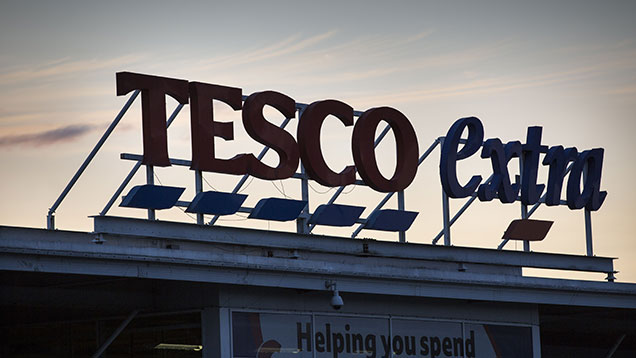Tesco boss says ‘sorry’ to supermarket’s suppliers
 ©Robert Perry/Rex Shutterstock
©Robert Perry/Rex Shutterstock Tesco’s chief executive has apologised to suppliers for the “unintended consequences” of chasing margins, which led to damaged supplier relations.
Dave Lewis, who took over as boss of Britain’s biggest retailer at the end of 2014, made the apology to a packed audience of suppliers and leading brands at a conference organised by IGD, a charity dedicated to providing information and best practice for the food industry, on Tuesday.
Mr Lewis said looking back, the supermarket had lost its way by pursuing margins to the detriment of the brand, customers and supplier relationships.
See also: Tesco UK profits plummet 70%
“When we talked just about margin, there were unintended consequences,” said Mr Lewis. “Our suppliers have felt it for a number of years.”
“The only thing we can say is sorry,” he added. “We can never go back – all we can do is draw a line under it.”
In an unusually open address for a retailer, he said Tesco’s internal review last year conducted by audtiors Deloitte, had found 69 cases of possible breaches of the Groceries Code of Practice, mostly relating to the late payment of suppliers.
The managers who made those mistakes and decisions had been replaced, Mr Lewis told suppliers, and Tesco would now move towards “open, transparent relationships”.
Standardised payment terms announced
In a move towards this, Mr Lewis announced Tesco would be standardising the time it took to pay its suppliers.
“We can never go back – all we can do is draw a line under a it”
Dave Lewis, Tesco
Currently the average payment term length is 40 to 42 days, he said, but from June 2016 this would change.
Suppliers of fruit, vegetables, meat, fish and poultry will be paid 23 days after the invoice is received if they supply up to £10m-worth of goods annually and within 28 days if they supply more than this.
Dairy suppliers will be paid within 35 days and 40 days as above depending on the worth of goods they supply.
Businesses across all categories supplying no more than £100,000 worth of goods will be paid in 14 days.
Supermarket buyers are known to renegotiate payment terms with suppliers beyond their standard terms, but a Tesco spokesman said with the new terms, buyers would not be able to do this.
The standard terms would allow Tesco to spend less time negotiating and more time working with suppliers to develop innovative products, said Mr Lewis.
Supplier relations were particularly damaged last year when Tesco’s accounting scandal was linked to supplier payments.
Reaction to standardised terms
Ruth Mason, chief food chain advisor, NFU
The move was “largely positive” said Ms Mason, as any simplification of terms was a benefit and it might help supplier’s exposure to volatility.
However, the devil would be in the detail and it would likely take a long time to be put in place, given the challenges the retailer had been facing, she said.
Duncan Swift, head of the food advisory team and insolvency specialist at Moore Stephens
“It’s good news if it gets major retailers to contemplate, and possibly compete against each other, on basis of how quickly they pay an agreed price to suppliers.
“However just how much ‘good news’ it represents is too early to say as it lacks detail.”
Mr Swift said he would like to see more information on:
- How many smaller suppliers (defined as a firm supplying goods to a value of up to £100,000/year) Tesco actually has, as it is only these companies that would benefit from the 14-day payment terms
- To what extent the payment terms differ from current practice
- Why it should take until June 2016 to put into practice.
Tesco board culture did seem to be changing for the better, added Mr Swift, but the proof would be in the pudding as to whether that filtered down to the buying teams.
Under previous chief executive, Philip Clarke, this had not happened, he added.
John Armour, food and supply chain policy manager, NFU Scotland
“It is important that Tesco institute payment terms with their suppliers which are not only timely, but that see a fair share of profits coming back to primary producers.
“It is clear that Tesco views working with UK agriculture as an important aspect to strengthening the supply chain, and we must see this belief transformed in to on-farm returns.
“It is vital then that suppliers, large and small, receive payment terms that sustain cashflow and ensure a fair return for the food that they produce.”

